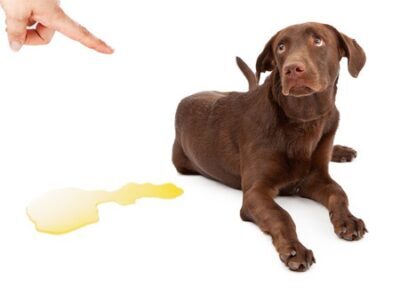Dealing with a dog that pees inside the house can be frustrating and confusing for pet owners. It’s important to remember that there may be various reasons a dog might pee indoors, and addressing the issue requires patience and understanding. In this article, we will explore some strategies and techniques on how to stop dogs from peeing in the house.
You can take several steps to prevent your dog from peeing in the house. First, ensure that your dog is getting enough exercise and attention. A dog not getting enough physical and mental stimulation may act out by peeing in the house. Ensure to take your dog for regular walks and provide plenty of toys and activities to keep them entertained.
Second, it is essential to establish a consistent routine for your dog. This includes taking them outside to go potty at regular intervals and providing a designated spot for them to relieve themselves. Consistency is critical in training your dog, so be sure to take them outside at the exact times each day and praise them when they go potty in the appropriate spot.
Finally, if your dog still has accidents in the house, it may be helpful to confine them to a specific area or use a crate when you cannot supervise them. This can help prevent accidents and allow you to monitor their behavior closely. If you are consistent in your training and give your dog the attention and care they need, you should be able to prevent them from peeing in the house.
How to stop dogs from peeing in the house
To stop your dog from peeing in the house, it is crucial to establish a consistent routine for taking them outside to pee. This includes taking them out after waking up, after meals, and after playtime. Crate training can also prevent your dog from peeing inside, as it provides a designated space for them to sleep and rest.
It is pertinent to use a crate that is just large enough for your dog to stand up, turn around, and lie down in.
Positive reinforcement can also be a valuable tool in preventing your dog from peeing inside. When you catch your dog going outside to pee, praise and reward them with treats to reinforce the behavior you want to see.
If your dog is marking territory by peeing inside, a belly band can be a helpful tool to prevent them from doing so. A belly band is a band that fits around your dog’s waist and covers its genitals, preventing them from being able to mark its territory.
If these strategies do not work, consulting with a veterinarian or a professional dog trainer may help address any underlying medical or behavioral issues.

Why does my dog keep peeing in the house?
There could be various reasons why your dog is peeing in the house. Some common causes include:
Medical issues
If your dog suddenly starts to pee in the house, it may be due to a medical issue such as a urinary tract infection or incontinence.
Lack of consistent routine
Dogs thrive on routine, and if they are not taken outside to pee consistently, they may become confused and accidentally pee inside.
Lack of proper training
If your dog needs to be adequately trained to go outside to pee, it may not understand that it is inappropriate to pee inside.
Stress or anxiety
Dogs may pee inside due to stress or anxiety, particularly if they are experiencing changes in their environment or routine.
Marking territory
Some dogs may pee inside to mark their territory, especially if they are not spayed or neutered.
To determine the cause of your dog’s peeing in the house, it may be helpful to consult with a veterinarian. They can help you identify the root cause and develop a plan to address the issue.
What stops dogs from peeing on the floor?
You can do several things to prevent a dog from urinating on the floor inside the house. First, it is vital to ensure that the dog is house-trained. This involves taking the dog outside frequently to a designated potty area and rewarding them with praise or treats when they are eliminated in the appropriate spot.
It may also be helpful to establish a routine for taking the dog out, such as taking them out first thing in the morning, after meals, and before bedtime.
Second, addressing any underlying medical issues causing the dog to urinate inside is essential. For example, if a dog is experiencing incontinence due to an underlying health condition, treating the disease may help to resolve the issue.
Finally, it may be helpful to manage the dog’s environment to prevent accidents. This can include providing the dog with a designated area to eliminate inside, such as a crate or a specific room with a potty pad, or limiting the dog’s access to certain areas until they are fully house-trained.
It may also be helpful to supervise the dog when they are inside and interrupt any attempts to eliminate indoors by immediately taking the dog outside to their designated potty area.
Do dogs eventually stop peeing in the house?
You can train dogs to stop peeing in the house, but it will likely take time and patience. The first step in addressing this issue is identifying the underlying cause of inappropriate urination. Is the dog still being entirely housed and trained? Is the dog marking territory? Is the dog experiencing a medical issue?
Once the cause has been determined, it will be easier to come up with an appropriate solution. One way to help prevent dogs from peeing in the house is to ensure they have regular opportunities to go outside to relieve themselves.
This means taking them out frequently, especially after eating or drinking, and ensuring they have access to a designated bathroom area.
Establishing a consistent routine for taking the dog outside and praising them when they go to the bathroom in the appropriate place is also helpful.
It’s essential to be patient and consistent in working with your dog to address this issue, as it may take some time for them to learn to go to the bathroom outside. With the proper training and management, dogs can stop peeing in the house.
Do housebroken dog urinate in house?
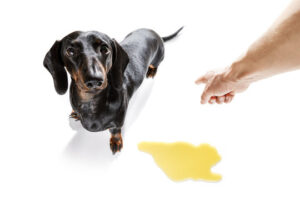
A housebroken dog urinating in the house is not normal behavior and could be a sign of an underlying issue. Some possible causes of a housebroken dog urinating in the home include:
Medical issues: A housebroken dog may start urinating in the house due to a medical subject such as a urinary tract infection or incontinence.
Lack of consistent routine: If a housebroken dog’s training has changed significantly or if they are not being taken outside to pee at regular intervals, they may need clarification and accidentally urinate inside.
Stress or anxiety: A housebroken dog may start urinating in the house due to stress or anxiety, particularly if they are experiencing changes in their environment or routine.
Marking territory: Some housebroken dogs may start urinating in the house to mark their territory, especially if they are not spayed or neutered.
Why is my dog intentionally peeing in the house?
There could be several reasons your dog is intentionally peeing in the house. It’s essential to consider your dog’s age, medical history, and any changes in its routine or environment.
One possibility is that your dog is experiencing a medical issue, such as a urinary tract infection or bladder stones, which can cause them to urinate more frequently or involuntarily. It’s always a good idea to have your dog checked out by a veterinarian to rule out any underlying medical conditions.
Another possibility is that your dog exhibits a behavior issue, such as marking territory or seeking attention. This could also be a contributing factor if your dog is not spayed or neutered. It’s essential to identify and address the root cause of the behavior to manage and resolve the issue effectively.
How do you discipline a dog after peeing in the house?
Disciplining a dog for urinating in the house can be challenging, but addressing the behavior is essential to prevent future accidents. Here are three steps you can follow in disciplining your dog after they have peed in the house:
- First and foremost, remaining calm and not getting angry with your dog is essential. Yelling or punishing them harshly will only confuse and scare them and will not effectively address the underlying behavior.
- Clean up the mess thoroughly, using an enzymatic cleaner to eliminate any remaining odors. This will help to prevent your dog from being attracted back to the same spot in the future.
- Consider consulting with a veterinarian or a professional trainer to identify the root cause of the behavior and develop a plan for addressing it. It could be due to a medical issue, stress, or a lack of proper training and supervision. By addressing the underlying cause, you can help to prevent future accidents and teach your dog to go potty outside.
Do dogs pee in the house for attention?
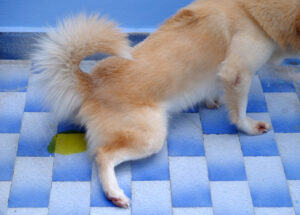
A dog may pee in the house for attention, but it is also essential to consider other possible reasons for this behavior. One of the reasons for a dog to pee in the house is a need for proper training or house-breaking. Dogs may also pee in the house if they are experiencing a medical issue, such as a urinary tract infection or bladder stones.
If a dog is peeing in the house and there are no medical issues at play, then there is a possibility that the behavior is a result of anxiety or stress. Dogs may exhibit inappropriate elimination behaviors when they are feeling anxious or stressed, which can result from changes in their environment or routine or separation anxiety.
If a dog is peeing in the house for attention, it is vital to address the root cause of this behavior. Providing consistent training and reinforcement for appropriate elimination behaviors and managing any underlying anxiety or stress can help prevent the dog from engaging in this behavior.
Also, remember that punishment is not an effective method for addressing this behavior and may only serve to worsen the issue. Instead, it is crucial to use positive reinforcement and consistent training to encourage the dog to engage in appropriate behaviors.
Do dogs feel guilty after peeing in the house?
It is not uncommon for owners to feel that their dogs show signs of guilt or shame after having an accident in the house, such as urinating or defecating. Dogs may exhibit behaviors such as avoiding eye contact, cowering, or hiding when they have done something wrong. However, note that these behaviors are not necessarily a sign of guilt or shame.
Dogs do not have the same cognitive abilities as humans and cannot feel guilt or shame like we do. Instead, the behaviors that we interpret as guilt or shame are more likely to be a response to our reactions and body language.
For example, if an owner becomes angry when their dog has an accident in the house, the dog may cower or hide because of their owner’s reaction rather than out of guilt or shame.
Will vinegar stop dog peeing in same spot?
Vinegar is often recommended as a natural cleaning solution for removing dog urine from surfaces. It can effectively remove the odor of urine, as the acetic acid in the vinegar helps neutralize the ammonia in urine. However, vinegar alone will not likely stop a dog from peeing in the same spot.
To prevent a dog from peeing in the same spot, it is vital to identify and address the underlying cause of the behavior. This may include establishing a consistent routine for taking the dog outside to pee, providing additional training or behavior modification, or addressing any medical or behavioral issues.
Using vinegar to clean up the urine may help remove the odor, but it is not a solution to stop the behavior. If your dog is consistently peeing in the same spot, it is essential to consult a veterinarian or a professional dog trainer to address the issue.
What scent will deter dogs from peeing?
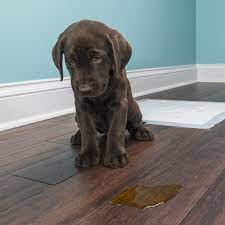
A few scents may deter dogs from peeing in a particular area. Some people have found that using citrus scents, such as lemon or orange, can help to dissuade dogs from urinating in a specific area. Other scents that may be effective include:
Peppermint: Peppermint has a strong, pungent smell that many dogs find unpleasant.
Vinegar: The acetic acid in vinegar can be a deterrent for some dogs.
Ammonia: Ammonia has a strong, pungent smell similar to urine. Some dogs may be less likely to pee in an area that smells like urine.
You should note that these scents may not work for all dogs and may not be effective in all cases. Additionally, it is not recommended to use strong scents to punish or reprimand a dog for urinating in the house, as this can be confusing and unpleasant for the dog.
Will neutering stop a dog from peeing in the house?
Neutering, or spaying in the case of female dogs, can effectively reduce or eliminate certain types of inappropriate urination in dogs.
Neutering can help reduce or eliminate marking behavior, which is when a dog urinates small amounts on vertical surfaces to mark their territory. Marking is more common in male dogs, and neutering can effectively reduce or eliminate this behavior.
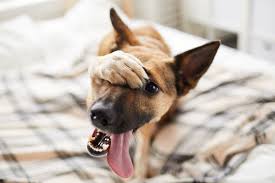
However, it is essential to note that neutering does not guarantee that a dog will stop peeing in the house. There may be other underlying causes for inappropriate urination, such as medical issues, lack of consistent routine, lack of proper training, or stress or anxiety.
How long after neuter will dog stop marking?
After a dog is neutered, it may take several weeks or even months before they stop marking their territory but two months on average. This is because the behavior is often ingrained and may take time for the dog to unlearn.
However, neutering can help reduce the overall prevalence and intensity of marking behavior, as it removes the hormone-driven desire to mark territory often associated with intact males.
It is important to remember that many factors can contribute to marking behavior in dogs, including anxiety, stress, and a lack of proper training.
In addition to neutering, addressing these underlying causes and providing consistent training and reinforcement can also help reduce or eliminate marking behavior in dogs.
As with any behavior modification process, it is essential to be patient and consistent in your efforts, as it may take time for the dog to learn and unlearn certain behaviors.
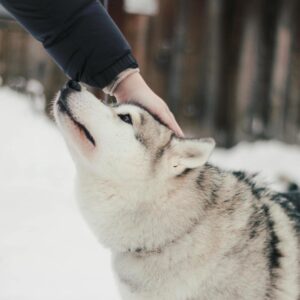
What can I spray to keep my dog from peeing in the house?
Several products are available that claim to deter dogs from peeing in the house, including sprays and oils that can apply to surfaces to create an unpleasant smell or taste. Some of these products contain herbal, or citrus scents meant to be displeasing to dogs, while others control bittering agents that make the surface taste unpleasant.
It is important to note that these products are not a guaranteed solution for preventing a dog from peeing in the house. Dogs have different sensitivities and preferences, and what works for one dog may not work for another.
Additionally, relying on these products as a sole means of preventing inappropriate urination is not recommended, as they do not address the underlying cause of the behavior.
How to stop female dog from peeing in house
It is crucial to determine the underlying cause of the behavior to stop a female dog from peeing in the house. There could be medical reasons for the conduct, such as a urinary tract infection or bladder stones, which a veterinarian should rule out.
Once any potential medical issues have been addressed, it is vital to establish a consistent routine for taking the dog outside to use the bathroom. This should include taking the dog out at regular intervals, praising and rewarding it for going out, and supervising the dog indoors to ensure that it does not have the opportunity to pee inside.
It may also be helpful to confine the dog to a specific area of the house or to use a crate when one cannot supervise the dog.
Finally, it is essential to be patient and consistent in training, as it may take time for the dog to learn the desired behavior.
Conclusion
In conclusion, how to stop dogs from peeing in the house is to identify the underlying cause of the behavior and take appropriate steps to address it. This may involve implementing a consistent schedule and routine for taking the dog outside to go potty and consulting with a veterinarian if a medical issue is suspected.
Then, addressing any underlying stress or anxiety and using tools such as a crate or baby gates to limit the dog’s access to certain areas of the house will help so much.
By addressing the root cause and providing the necessary support and training, it is possible to successfully stop a dog from peeing in the house.

